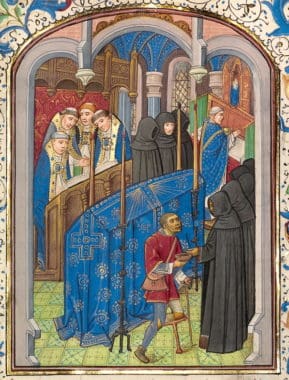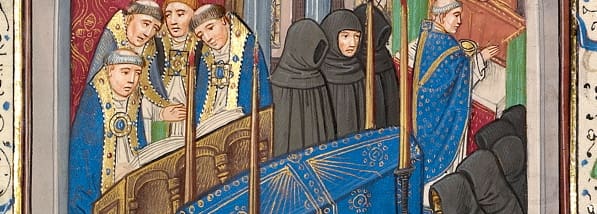Dear Father John, we have Mass said for the repose of a soul during their funeral. The Eucharist itself is said to be infinitely valuable and thus there is no  greater value to offer to God. Why do we follow this with additional Masses particularly on the anniversary of the death of the individual given we cannot add to the value of the Mass? It also shows in the form of having novenas of Masses said as well for a particular intention, how would these carry more value than one Mass?
greater value to offer to God. Why do we follow this with additional Masses particularly on the anniversary of the death of the individual given we cannot add to the value of the Mass? It also shows in the form of having novenas of Masses said as well for a particular intention, how would these carry more value than one Mass?
Let me begin answering your question by asking you a question: If one Mass is an infinitely sufficient act of worship, why does the Church encourage us to go to daily Mass, and why does the Church require us to go to Mass every Sunday? Why don’t we just go once in a lifetime, and leave it at that?…
Our Participation in Mass Matters
Yes, the Mass (any Mass, every Mass), as the re-presentation and celebration of Christ’s “once-and-for-all” sacrifice of atonement at Calvary, has infinite value as worship, as petition, and as reparation. But God has arranged for that infinite value to be poured into our lives and the history of salvation only through our participation in the Mass (and in the life of the Church that flows from and leads back towards the Mass). And our participation in this perfect act of worship is not always perfect. Therefore, we keep coming back to it, linking our imperfect love and prayer to the perfect love and prayer of Christ, in order to keep his grace flowing in our lives and in the world, until everything is finally completed with “the summing up of all things in Christ” (Ephesians 1:10).
Offering More than One Mass for the Deceased
When we offer a Mass for a deceased loved one, we are asking God to apply the graces of the Mass to that person’s soul, so that their time of purification (purgatory) can be brought quickly to completion and they can enter into the fullness of heaven. This is a truly loving and faith-filled thing to do. The Catechism points this out: “From the beginning the Church has honored the memory of the dead and offered prayers in suffrage for them, above all the Eucharistic sacrifice, so that, thus purified, they may attain the beatific vision of God.” (CCC 1032). But our faith is imperfect, our love is imperfect, so it is possible that although our prayers and offering do indeed benefit the person who has passed away, they may not be sufficient to bring that person’s purification period to an end. And so, we continue to exercise both our faith and our love by having more Masses offered. This is a beautiful expression of the communion of all believers in Christ – a communion that transcends time and space.
If the person you offer the Mass for is already in heaven (if their stage of purification has been completed), then God will surely not let the offering go to waste – he will honor your love and faith and allow it to benefit another member of the Body of Christ. These offerings are not arithmetic; they are animated by faith and love, and as long as our faith and love (and hope) are alive and well, our offerings are a legitimate and fruitful expression and exercise of them, something that gives glory to God and that benefits the whole Church.
Mass Is Perfect, But We Are Not
Having said that, I also want to reaffirm what you mention in your question. Namely, the grace of each Mass is indeed infinite and sufficient for a perfect act of worship and the complete sanctification of a person, alive or dead. The fact that most of us are imperfect in our participation in the Mass (because of our immature faith, hope, and love, and because of our wounded human nature) doesn’t diminish the infinite value of the Mass. It’s like drinking from a flowing river with a little cup – the river has a much larger capacity than we can ever exhaust as long as our cup remains little.
Blessed Imelda Drinks the Whole River
This was illustrated beautifully in the life of the patron saint of first communicants, Blessed Imelda Lambertini. She lived in Bologna, Italy, in the 1300s. She wanted to be a nun from the time she was a little girl, and she joined a Dominican convent at the age of nine, to better prepare herself for the day when she would take the habit. Her greatest desire was to receive Holy Communion, but in those days you had to be at least twelve-years-old to do so. Imelda begged for an exception to the rule, but the chaplain refused. She kept praying for special permission. Her prayers were miraculously answered on the Feast of the Ascension in 1333.
After Mass that day, she stayed in her place in the chapel, while one of the nuns was putting away the sacred vessels. Suddenly, the nun heard a noise and turned towards Imelda. Hovering in mid air in front of Imelda as she knelt in prayer was a sacred Host, the Blessed Eucharist, shining with a bright and forceful light. The frightened nun ran to find the chaplain. By the time the chaplain arrived, the rest of the nuns and other onlookers had crowded, awe-struck, into the chapel. When the priest saw the shining, hovering host, he put on his vestments, went over to the girl, took the miraculous host in his hands, and gave her Holy Communion. Some minutes later, after the crowd had dispersed, the mother superior came over to Imelda to call her for breakfast. She found the girl still kneeling, with a smile on her face. But Imelda was dead. She had died of love, in ecstasy after receiving Christ in the Eucharist. Her faith and love were so pure and full that one single Holy Communion was sufficient to ready her completely for heaven. Blessed Imelda’s body is incorrupt, and you can still see it today in the Church where she is interred, in Bologna, Italy.
The example illustrates both the power of God’s grace at work in the Mass, and also the mystery of how our participation in the Mass, our level of faith, hope, and love, affects how that power impacts our lives and the life of the world.
I hope these reflections help answer your questions. God bless you!
In Him, Fr. John
+
Art: Detail from Mass for the Dead, Willem Vrelant (Flemish illustrator), early 1460s, PD-US author’s life plus 100 years or less, published in the U.S. prior to January 1, 1923, Wikimedia Commons.


